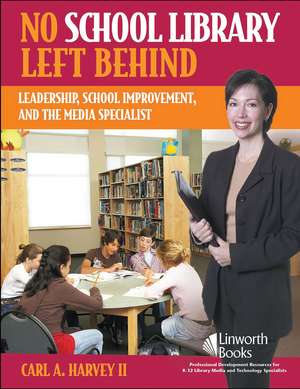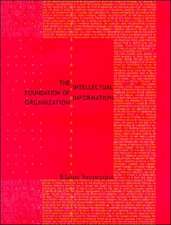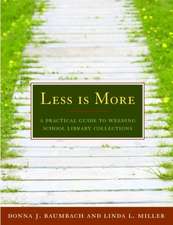No School Library Left Behind: Leadership, School Improvement, and the Media Specialist
Autor Carl A. Harvey IIen Limba Engleză Paperback – 24 apr 2008 – vârsta până la 17 ani
Preț: 234.12 lei
Preț vechi: 287.42 lei
-19% Nou
Puncte Express: 351
Preț estimativ în valută:
44.80€ • 46.90$ • 37.07£
44.80€ • 46.90$ • 37.07£
Carte tipărită la comandă
Livrare economică 07-21 aprilie
Preluare comenzi: 021 569.72.76
Specificații
ISBN-13: 9781586832339
ISBN-10: 1586832336
Pagini: 128
Dimensiuni: 152 x 229 x 8 mm
Greutate: 0.18 kg
Ediția:New.
Editura: Bloomsbury Publishing
Colecția Linworth
Locul publicării:New York, United States
ISBN-10: 1586832336
Pagini: 128
Dimensiuni: 152 x 229 x 8 mm
Greutate: 0.18 kg
Ediția:New.
Editura: Bloomsbury Publishing
Colecția Linworth
Locul publicării:New York, United States
Notă biografică
Carl A. Harvey II is an instructor of school librarianship at Longwood University in Farmville, VA. Previously, he was an elementary school librarian for 17 years in Indiana.
Recenzii
This title is well-organized, and the author's knowledge and experience is evident! The book will provide a useful primer for library media specialists seeking to better define their leadership role within the school environment.
This succinct guide shows library media specialists how to create exemplary programs that are aligned with school objectives, including improvement plans, processes, and outcomes, and how to measure the value of these efforts, especially in terms of academic standards and the development of information literacy skills. These criteria are often used to determine programs that should be supported and enhanced. The volume includes practical strategies; many informational sidebars, some of which are bibliographies; and appendixes that supply various assessment tools. It is an outstanding addition because of the wealth of tables, graphics, case studies, and professional and Web resources, all of which are well integrated into the text.
This slim volume packs a tremendous amount of useful, practical information into well-organized chapters and manageable subsections. The content constitutes a crash course in school improvement, covering definitions, history, legislation, research, best practices, assessment, profiles of accreditation associations, and most importantly, a strong rationale for why media specialists should lead the way in school improvement efforts. Fictionalized scenarios of how media specialists can move into leadership roles begin every chapter, and while they seem to reflect ideal situations, the accompanying strategies and straightforward advice provide realistic, effective suggestions that can be applied in any situation. Of particular note are the sections on reviewing library policies and practices to ensure they support school improvement goals, including an entire chapter devoted to how media programs can support math goals. The final chapter addresses school improvement beyond the building, including how library media specialists can enhance school improvement efforts through parent involvement, the school library Web page, and applying for grants and initiatives. Specialized bibliographies and lists of supporting Web sites are included throughout, as are easily accessible bulleted lists, accompanied by brief but well-reasoned explanations. Of major interest to novice and seasoned practitioners, this guide is timely and relevant. Highly Recommended.
This succinct guide shows library media specialists how to create exemplary programs that are aligned with school objectives, including improvement plans, processes, and outcomes, and how to measure the value of these efforts, especially in terms of academic standards and the development of information literacy skills. These criteria are often used to determine programs that should be supported and enhanced. The volume includes practical strategies; many informational sidebars, some of which are bibliographies; and appendixes that supply various assessment tools. It is an outstanding addition because of the wealth of tables, graphics, case studies, and professional and Web resources, all of which are well integrated into the text.
This slim volume packs a tremendous amount of useful, practical information into well-organized chapters and manageable subsections. The content constitutes a crash course in school improvement, covering definitions, history, legislation, research, best practices, assessment, profiles of accreditation associations, and most importantly, a strong rationale for why media specialists should lead the way in school improvement efforts. Fictionalized scenarios of how media specialists can move into leadership roles begin every chapter, and while they seem to reflect ideal situations, the accompanying strategies and straightforward advice provide realistic, effective suggestions that can be applied in any situation. Of particular note are the sections on reviewing library policies and practices to ensure they support school improvement goals, including an entire chapter devoted to how media programs can support math goals. The final chapter addresses school improvement beyond the building, including how library media specialists can enhance school improvement efforts through parent involvement, the school library Web page, and applying for grants and initiatives. Specialized bibliographies and lists of supporting Web sites are included throughout, as are easily accessible bulleted lists, accompanied by brief but well-reasoned explanations. Of major interest to novice and seasoned practitioners, this guide is timely and relevant. Highly Recommended.






